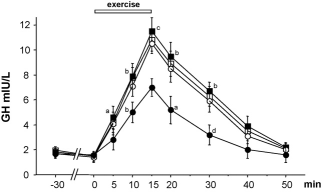|
Definition: "An ergogenic aid is any substance or phenomenon that enhances performance "
|
|
||||||||
09.04.2010 |
|
|
Endogenous growth hormone keeps older athletes young
Growth hormone
Synthetic hormones are still a very popular way of slowing down the aging process, but studies have shown that they have drawbacks. That's why the Italians are searching for a natural way of maintaining the body's production of growth hormone later in life.
Athletes produce more growth hormone after physical exertion. You also make more growth hormone while you sleep, but in adults this peak is nowhere near as high as the growth hormone peak after exercise. So do older athletes, because of regular exercise, maintain youthful levels of growth hormone production? That's the question the Italians set out to answer.
Study
Ten of the women were aged between 26 and 30 and did no regular sport [in the figure below: the black squares]. Ten other women were also aged between 26 and 30, but ran about 25 km a week [white squares]. Another ten of the women were aged between 42 and 46 and did not exercise [black circles]. And the last ten were aged between 42 and 46 but had been running about 25 km a week for the last 8 years [white circles].
Results
Fifteen years later, however, it's a different story. By that age a difference has arisen between the athletes and the non-athletes. For the subjects in their forties with a sedentary lifestyle, the growth hormone level after training goes up by a maximum of a factor 4.4. But the growth hormone level of the subjects in their forties who take regular exercise reacts the same as the subjects in their twenties.
Explanation
Source:
More:
|
|



